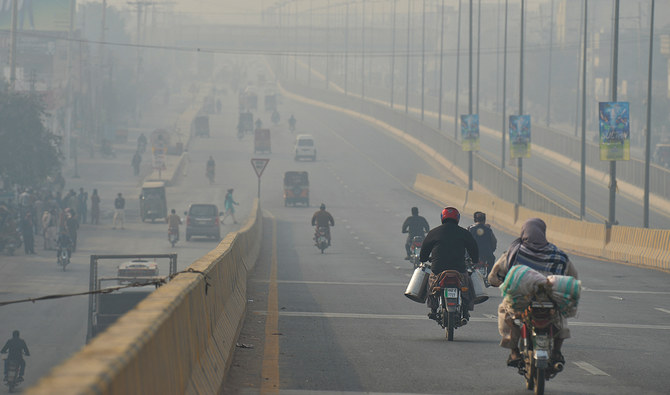
Ali, employed in a private company in Nowshera, expressed the increasing difficulty of his daily commute amid continuous fog and zero visibility, wondering about the unusual weather in Pakistan.
Over the past three to four days, Ali, who usually travels from Peshawar to Nowshera, has faced delays of 45 minutes on his journey, impacting both his arrival at work and return home.
This predicament extends beyond Ali, affecting millions across various cities in the country for the past four days. Office-goers and workers are grappling with delayed arrivals, aggravated by the cold's intensified severity due to the lingering fog.
Persistent Fog Alerts for the Week Ahead
The Meteorological Department predicts that the dense fog will persist throughout the week, enveloping certain areas in heavy fog for the next few days. Khyber Pakhtunkhwa's plains are expected to experience prolonged periods of heavy fog and smog.
Salma Jahangir, a Peshawar resident, reflected on the changing nature of winter fog, noting a peculiar smell in the current fog that wasn't present in her youth. She speculated, "I think it is smog because fog had no smell."
Also Read: Election Peril: Rising Attacks Pose Threat to Pakistan’s Political Landscape
Salma Jahangir highlighted the myriad problems caused by smog, leading to school closures and widespread disruptions in daily life. The smog has hindered timely arrivals at offices and workplaces, prompting many to cease attending altogether.
The adverse effects extend to health issues and an increase in road accidents, with visibility at 7 o'clock in the morning severely compromised, making it difficult for people to leave their homes even in emergencies. Additionally, cooking at home has become challenging due to gas shortages caused by the prevailing smog.
Unraveling the Causes of Smog
Climate change expert Akmal Khan shed light on the ongoing weather conditions, describing them as a combination of smog and fog due to partial cloud conditions. Various factors contribute to this phenomenon in Pakistan and Khyber Pakhtunkhwa, including the environmental impact of non-environmentally friendly Chingchi rickshaws. These rickshaws, ubiquitous in every street and neighborhood, emit hazardous smoke, further exacerbated by stagnant water in poorly maintained drains. The inadequate drainage system, coupled with the surge in population and vehicle numbers, poses significant environmental threats.
Akmal Khan emphasized the severe health risks associated with smog, linking the increased prevalence of diseases to climate change.
He emphasized the urgent need to address issues related to automobiles and enforce relevant laws. Neglecting these concerns could lead to perilous consequences in the future.
Climate Projections for Khyber Pakhtunkhwa until 2040
Akmal Khan conducted a comprehensive study covering 15 districts of Khyber Pakhtunkhwa, projecting the weather conditions until 2040. He noted a concerning trend of increasing winter temperatures, especially the nightly temperatures. The widening gap between night and day temperatures, coupled with a decline in winter rainfall, signifies indicators of climate change, with the current smog serving as a tangible example.
Khan revealed that summer rainfall now extends till April, while winter rainfall is diminishing, elevating the threat of climate change. Pakistan has already been ranked 5th among countries impacted by climate change.
According to Khan, substantial efforts are required for climate change adaptation. Addressing issues ranging from automobiles to sanitation and drainage is crucial, and concrete measures need to be implemented promptly to prepare for the challenges posed by climate change in the coming years.